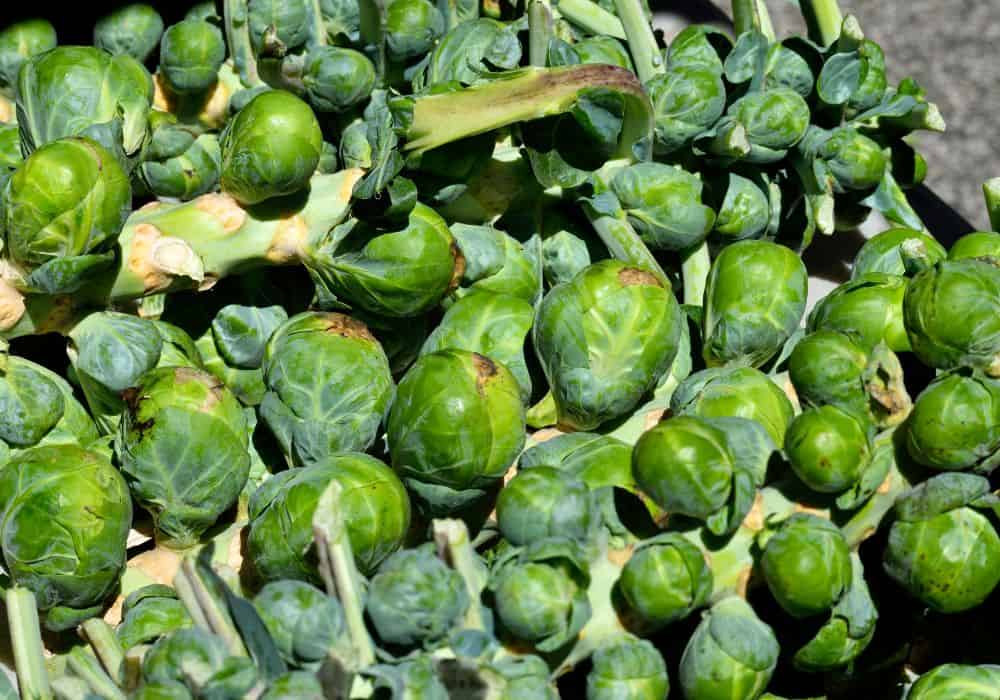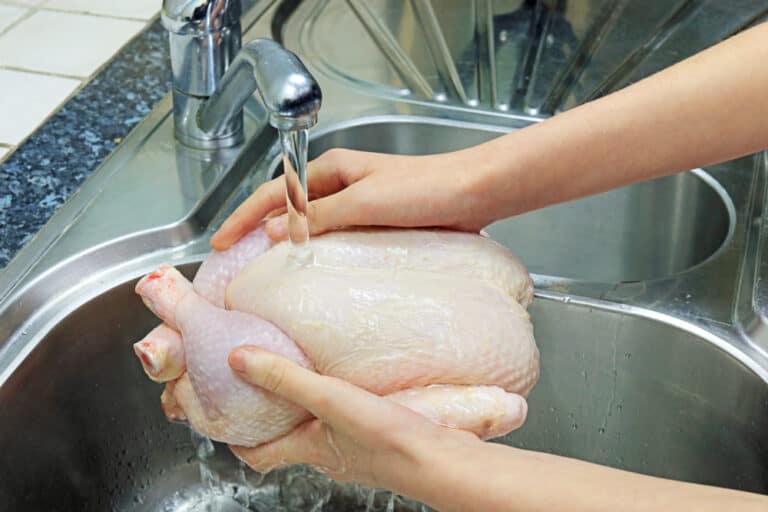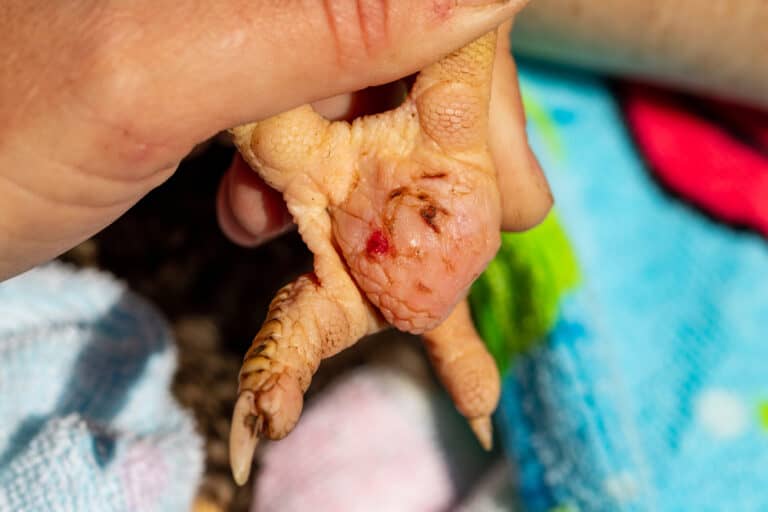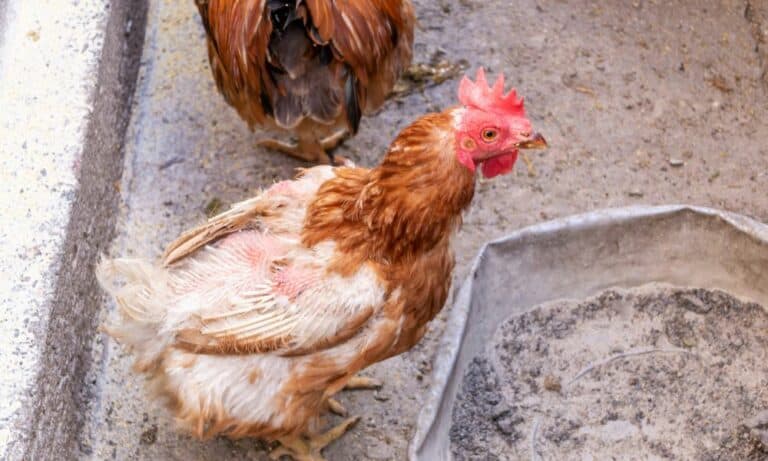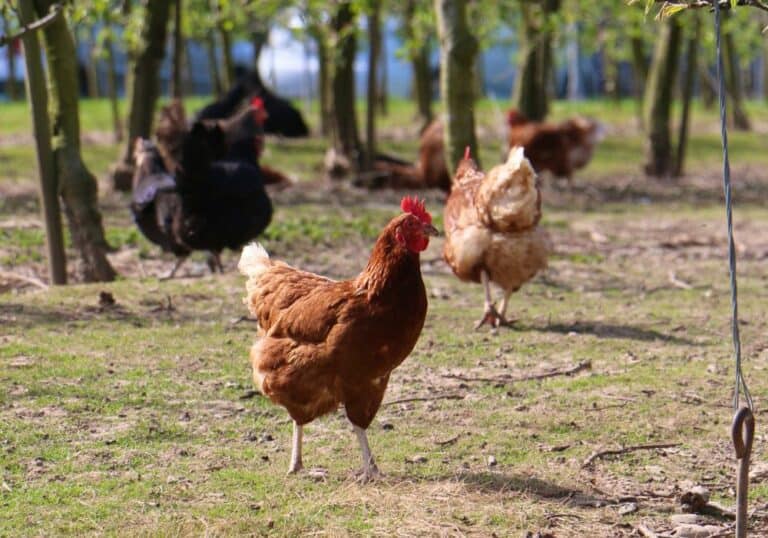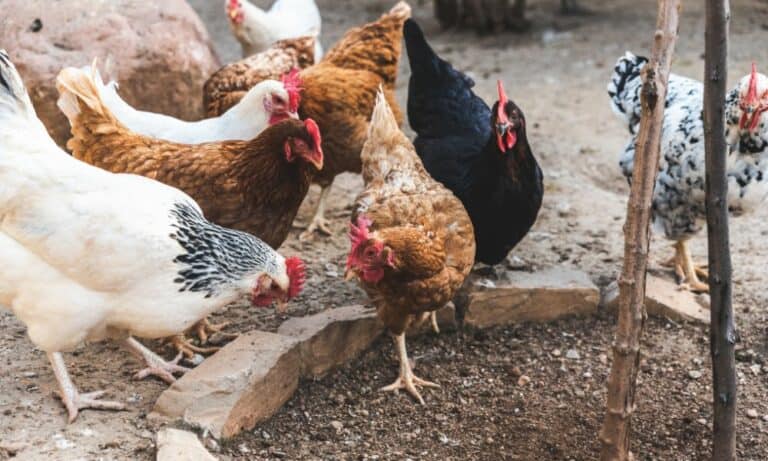Although chickens are known to snack on a variety of treats as long as it is easy to peck, easy to swallow, and filled with the necessary nutrients and vitamins the flock needs at every point, you may wonder, if chickens also eat Brussels sprouts.
Chickens can eat Brussels sprouts because they contain high nutritional content, which aids development. However, like most treats, you should serve this treat in moderation to prevent health problems like obesity.
In this guide, we’ll answer the question “Can chickens eat Brussels sprouts?”, provide details on the right amount you can feed them, and spell out some of the nutritional benefits of Brussels sprouts to chickens.
Can You Feed Chickens Brussel Sprouts?
Brussels sprouts are one of the healthy treats you can feed to your chicken and to make it better, the chickens love them, making it a win-win situation. However, like many other treats, you must feed your chickens this meal in moderation.
N.B: Ensure your chicken’s treat never shoots above 10% of its diet.
Whether in raw or cooked condition, chickens will eat Brussels sprouts, and it is best that you feed your chickens in bits to limit the risk of choking.
Nutritional Contents in Brussel Sprouts
Now that you are aware that your chickens can enjoy Brussels sprouts, it is wise that you are familiar with the nutritional contents of this green leafy vegetable so you know how it affects the development and diet of your flock. Here are some of the nutritional benefits of Brussels sprouts.
High Antioxidant Level
This vegetable possesses high antioxidant content that helps boost your flock’s immune system. Asides from boosting the general immune system, brussels sprouts also help to improve the quality of your chicken’s heart health and inflammation.
Additionally, the antioxidant in Brussels sprouts helps to eliminate free radicals and elements in the chicken’s system that may cause illness. These radicals can come from different sources, including the chickens’ food.
Fiber
No matter your chicken’s breed or age, fiber is a key nutrient you mustn’t do without when putting together a properly balanced diet for your chickens. Fiber assists with digestion in chickens and helps to limit the risk of ammonia in the chicken feces.
Chickens have delicate stomachs, making it compulsory for chicken keepers to infuse dietary fiber in their meals, which brussels sprout offers. This vegetable served in the right proportion helps with your digestive system.
It is advisable that you provide chickens with at least 10% fiber in their overall diet, which makes Brussels sprout a proper treat since it is fortified with this nutrient which helps to boost the chicken’s health.
Furthermore, fiber helps control chickens’ blood sugar while limiting the likelihood of the chickens developing heart problems.
Protein
Protein is a healthy nutrient needed for a chicken’s development and growth. A cup of Brussels sprouts has about 3.4g of protein, which makes it a good snack option for chickens and helps to aid their growth and development.
This option is best for chicks because smaller chickens need all the protein they can get. After all, it will help them grow and develop faster. It also helps to build the chicken’s muscles which makes them stronger.
Vitamin C
Vitamin C is essential for maintaining a chicken’s general health, and because they can not produce this vitamin on their own, it becomes necessary to provide an external source of vitamin C to help the chickens.
Brussels sprouts are a good option because they are filled with this vitamin. A vitamin C deficiency will result in the risk of your flock falling sick more than usual, so giving them treats like Brussels sprouts helps to introduce vitamin C into their system, thereby boosting their immune system.
Manganese
Manganese directly impacts the quality of your eggs, making it necessary that you infuse treats high in manganese into your chicken’s diet. The thickness of the eggshell and the quality of eggs produced all depends on the level of manganese in the chicken diet.
For those keeping chickens for commercial purposes, you need to ensure that whatever treats you give to your flock are rich in manganese to get the best results during egg production.
To fully absorb protein and increase metabolism, you should feed chickens with treats high in manganese, and Brussels sprouts are one such treat.
Folate
This nutrient, also known as vitamin B-9, aims to ensure the proper production, flow, and circulation of blood in the system. Brussels sprout is one of the treats with high folate content, which makes it good for chickens.
Additionally, hens and all other female animals require a good folate level during pregnancy; treating them to Brussels sprouts is one way to introduce this nutrient into their body.
Folate also helps your chicken’s feathers grow better while increasing its appetite and preventing the risk of anemia.
Vitamin A
In the first few weeks of development, young chicks struggle with mucus production, which means you must incorporate vitamin A into the flock’s diet to aid mucus production. Luckily, brussels sprout is rich in this vitamin and helps to produce mucus in the esophagus, nose, and eyelids.
Mucus is necessary to prevent the entrance of microbes into the chicken’s body and acts as a lubricant so it is easy for food to pass through thereby aiding digestion. Asides from digestion, the minerals also help to aid reproduction.
So, for commercial chicken keepers, you want to consider a treat with more vitamin A content like Brussels sprouts, to aid your chicken’s growth.
Vitamin K
This vitamin helps prevent severe injuries because it helps with the formation of blood clots so that your chickens do not bleed whenever they sustain injuries. A vitamin K deficiency in this situation would mean that the chicken will bleed continually from any cut.
Vitamin K also helps to metabolize calcium. Without it, the bone density of your chickens will be weak and the quality of the eggshells will decline for laying hens. Adding Brussels sprouts to your flock’s diet is a good way to ensure they do not lack vitamin K.
Low Calories
A major problem with feeding your chickens treats is that they often indulge and fill up their system with treats leaving no space for their actual meals. One of the great facts about Brussels sprout is that it has a low-calorie and carb content.
This means that your chickens can indulge to a certain extent and will still be able to eat their regular meals.
6 Different Ways You Can Feed Chickens Brussels Sprouts
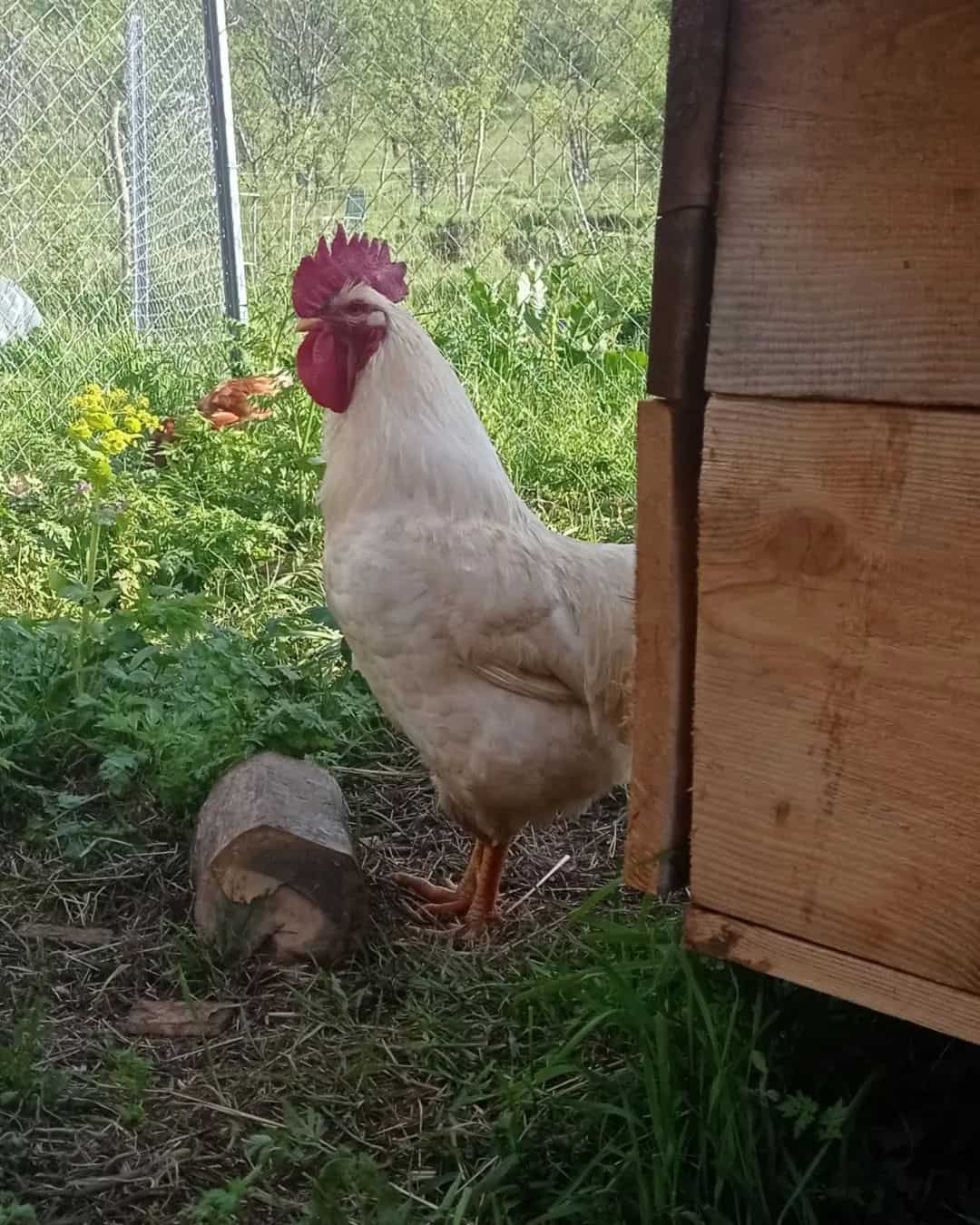
Chickens are not so picky; therefore, they can enjoy this treat in several ways. Here are six different ways to feed Brussels sprouts to young chickens.
1. Feeding Chickens Raw Brussels Sprouts
Your chickens eating Brussels sprouts will be the best way to feed the flock if you want to retain all the nutritional content in this vegetable. Cooking the Brussels sprout tends to diminish the nutrient value, which is why many chicken keepers would opt for raw vegetables.
Although it may seem harder for the chickens to eat, you should remember that chickens have particularly strong beaks and will be able to tear the vegetable apart piece by piece. For young chicks, it is best to have the vegetables chopped so it is easier for them to eat.
2. Feeding Chickens Frozen Brussels Sprouts
Serving your flock frozen Brussels sprouts is as good as serving them raw. This involves refrigerating the vegetables until it is cold before serving the flock. The good thing is this method also helps you retain the nutritional content of the vegetable.
Furthermore, treating your chickens to this frozen snack in the summer months is a thoughtful idea to help them cool off from the heat in your little way. It is best to freeze chopped Brussels sprouts to make it easier for the chickens when eating.
3. Feeding Chickens Cooked Brussels Sprouts
Another alternative you have when serving your chicken brussels sprouts is to cook the vegetables first before you feed them. While this may not be the best method for nutrient conservation, it is the easiest and safest because the risk of any choking hazard is limited.
All you need to do is fry with preferably olive oil in your pan with medium heat and take it off when tender. However, we advise you not to add salt when frying because a high salt intake is toxic to chickens and they can fall sick.
Additionally, you can steam the vegetables before serving the flock. You should know that these cooked vegetables have a time limit; once the cooked Brussels sprouts are over three days, we do not advise serving this treat.
4. Feeding Chickens Stringed Brussels Sprouts

Stringing treats is a fun new way of feeding chickens. Asides from the fact that it is fun watching chickens attempt to peck at their meals, it is also an interesting boredom buster for the flock.
This feeding method involves hanging the Brussels sprouts you intend to feed the flock with strings while they peck at their treat. Such an act leaves the chickens intrigued and occupied even while eating.
5. Feeding Chickens Brussels Sprouts as Sprout Salad
Serving your chickens Brussels sprout salad is an even healthier way to treat the flock. This involves mixing up different vegetables with Brussels sprouts for your chickens to eat, exposing them to various other vegetables with more nutrients.
Your chicken will enjoy this burst of flavor because of the different mixes and the differences in taste. You can add other vegetables like cabbage, carrot, sugar snap peas, and broccoli to the mix.
N.B: We advise that you do not add nightshade vegetables like eggplant, peppers, and tomatoes to your salad because they contain harmful toxins that will affect your chicken.
You can also add fruits like bananas, melon, and strawberries to improve the taste of the salad. Seeds and grains like quinoa or chia seeds can also be in the mix because they add to the treat’s nutritional content.
6. Feeding Chickens Brussels Sprouts with Regular Feed
Combining a nutritious treat like Brussels sprouts with your chicken feed gives your flock twice the nutritional value. All you need to do is chop up little vegetable pieces and mix them with the regular feed.
This helps boost the growth and development of the flock, and it is also very filling, so you can be sure your chickens are eating enough.
Parts of Brussels Sprouts to Feed Chickens
You may need clarification about what part of the Brussels sprouts to serve your flock. Here are the parts you should know and how to serve them to chickens.
Brussel Sprout Plants
Backyard chickens have a higher chance of snacking on vegetable plants like this, especially if you have a garden where you plant such treats. You can be sure these chickens will always find their way into your garden and eat what they find.
Thankfully, the plants are safe for them to consume, but the risk of choking and overfeeding makes it important that you guard your garden so you can control how your chickens eat the plant.
Brussel Sprout Stalks
The stalks usually have the same nutrient content as the vegetables, so before throwing them out, you should consider feeding them to your chickens first. It is preferable to cook this part of the vegetable. However, you must know that cooking the stalks takes longer than other parts of the vegetables.
Brussel Sprout Leaves
Brussel sprouts like cabbage and kale also sprout leaves while growing, which also have nutrients beneficial to your chickens, so you can include them as a treat for the flock. Cooking makes it softer and easier to chew, so you may want to consider this option.
Feeding Your Chickens
There are meals you should add to your chicken’s diet because of the nutrients they offer, and there are others you must consider because they are quite harmful to chickens. Below are some of these treats.
Treats To Feed Your Chicken
- Broccoli
- Pumpkin
- Cabbage
- Carrot
- Sweet Potatoes
- Zucchini
Treats to Keep Away from Your Chickens
- Chocolates
- Nightshade Vegetables
- Stale Meals
Final Thoughts
Brussels sprout is a good vegetable treat for chickens as it contains the essential nutrients that help especially young chickens develop properly. However, as with any other treat, you must remember that the key is to feed the chickens in moderation.
When picking a treat for your chickens, always confirm the following:
- Pick a treat that serves the nutritional benefit your flocks need
- It is better to cut up treats into smaller pieces to avoid choking hazard
- Chickens will eat almost anything, so it is up to you to pick the right treat


